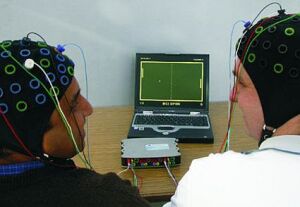Brain-Computer Interface Technology Licensed to Neurolutions
by
Astrid Fiano, DOTmed News Writer | April 08, 2009

Brain-computer interface
(BCI) technology
A brain-computer interface (BCI) technology that was jointly invented by researchers in the New York State Department of Health's Wadsworth Center laboratories and at Washington University, St. Louis, MO, has recently been licensed to Neurolutions Inc., according to a press release on the Wadsworth Center website.
The licensing agreement was developed by Health Research Inc., a not-for-profit corporation that facilitates technology transfer of basic research for the Department of Health.
Neurolutions is a newly formed company located in St. Louis, MO. Wadsworth says that the company will develop and commercialize medical devices that "directly harness the brain's electrical signals for communication and control systems for people with severe motor disabilities." The potential applications include controlling prosthetic limbs and operating wheelchairs or computers.
The BCI systems use sophisticated computer algorithms that translate brain waves into physical outputs, such as moving a cursor on a computer screen. The Wadsworth press release says that Neurolutions' system uses wireless technology placed on the surface of the brain to transmit electrocorticographic (ECoG) signals from the motor cortex, where the brain controls movement. The advantages of ECoG are cleaner signals and finer control, such as potentially allowing movement of five individual fingers of a prosthetic hand. The technology being developed involves surgically implanted electrodes in the brain, requiring less training than for systems using scalp-recorded brain waves, although there are risks associated with BCI.
"Collaborating with clinicians and others at Washington University has helped move BCI technology another step forward. Within the next decade, I anticipate an array of brain-controlled devices such as hand or even finger prostheses," said Dr. Gerwin Schalk, Ph.D.
Dr. Schalk, a research scientist, is Wadsworth Center's principal collaborator with the neurologists and biomedical engineers at Washington University. Dr. Schalk is a BCI signal processing expert and chief architect of BCI2000, a BCI research and development platform used by more than 200 laboratories worldwide. The Washington University partners have tested the technology in 20 patients who were undergoing surgery for treatment of epilepsy.
State Health Commissioner Richard F. Daines, M.D., also stated, "The Wadsworth Center has benefited significantly from Health Research Inc.'s expertise. Their assistance with this brain-computer interface licensing agreement means that this innovation is closer to making a difference in people's lives."
Based upon a press release by the Wadsworth Center.
